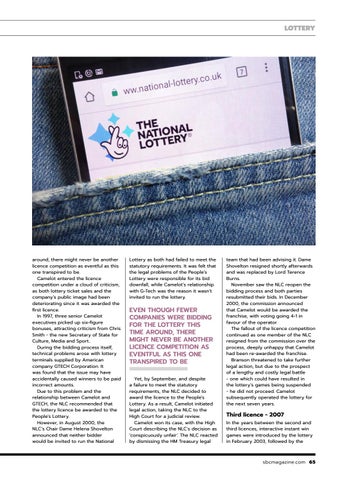LOTTERY
around, there might never be another licence competition as eventful as this one transpired to be. Camelot entered the licence competition under a cloud of criticism, as both lottery ticket sales and the company’s public image had been deteriorating since it was awarded the first licence. In 1997, three senior Camelot executives picked up six-figure bonuses, attracting criticism from Chris Smith - the new Secretary of State for Culture, Media and Sport.. During the bidding process itself, technical problems arose with lottery terminals supplied by American company GTECH Corporation. It was found that the issue may have accidentally caused winners to be paid incorrect amounts. Due to this problem and the relationship between Camelot and GTECH, the NLC recommended that the lottery licence be awarded to the People's Lottery. However, in August 2000, the NLC’s Chair Dame Helena Shovelton announced that neither bidder would be invited to run the National
Lottery as both had failed to meet the statutory requirements. It was felt that the legal problems of the People’s Lottery were responsible for its bid downfall, while Camelot’s relationship with G-Tech was the reason it wasn’t invited to run the lottery.
EVEN THOUGH FEWER COMPANIES WERE BIDDING FOR THE LOTTERY THIS TIME AROUND, THERE MIGHT NEVER BE ANOTHER LICENCE COMPETITION AS EVENTFUL AS THIS ONE TRANSPIRED TO BE Yet, by September, and despite a failure to meet the statutory requirements, the NLC decided to award the licence to the People's Lottery. As a result, Camelot initiated legal action, taking the NLC to the High Court for a judicial review. Camelot won its case, with the High Court describing the NLC's decision as ‘conspicuously unfair’. The NLC reacted by dismissing the HM Treasury legal
team that had been advising it. Dame Shovelton resigned shortly afterwards and was replaced by Lord Terence Burns. November saw the NLC reopen the bidding process and both parties resubmitted their bids. In December 2000, the commission announced that Camelot would be awarded the franchise, with voting going 4-1 in favour of the operator. The fallout of the licence competition continued as one member of the NLC resigned from the commission over the process, deeply unhappy that Camelot had been re-awarded the franchise. Branson threatened to take further legal action, but due to the prospect of a lengthy and costly legal battle - one which could have resulted in the lottery’s games being suspended - he did not proceed. Camelot subsequently operated the lottery for the next seven years.
Third licence - 2007 In the years between the second and third licences, interactive instant win games were introduced by the lottery in February 2003, followed by the
sbcmagazine.com 65
